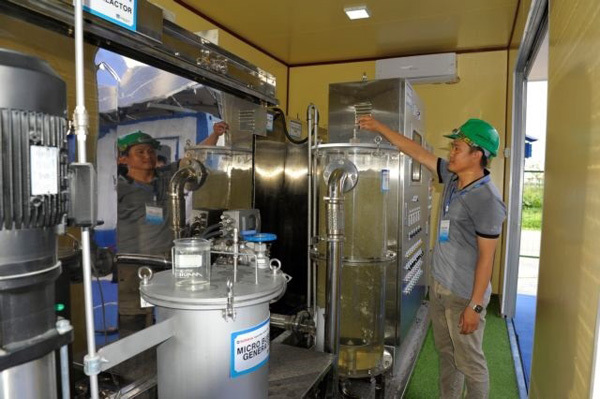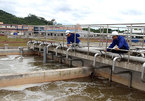 |
|
Part of an at-source wastewater treatment facility for households and trade villages at Dong Anh District, Hanoi, that was launched in July. |
What has Hanoi achieved in its efforts to reduce levels of air pollution in its traditional trade villages?
As part of efforts to protect the environment in Hanoi’s trade villages, the city’s Department of Natural Resources and Environment was allocated to develop guidelines on how to define the levels of pollution in traditional trade villages and plans to solve environmental pollution.
A survey on the level of pollution in 127 traditional trade villages found serious water pollution in 33 villages and minor water pollution in 19 more.
Based on the results of the survey, the Hanoi People’s Committee decided to build the Cau Nga waste water treatment plant with an output of 20,000m3 of waste water per day. The plant started operation in October 2016. Right now two more waste water treatment plants are under construction in the districts of Hoai Duc and Thanh Oai.
In addition, authorities have called for investment to develop eight projects to treat waste water and solid waste from trade villages in the districts of Quoc Oai, Me Linh, Hoai Duc and Thuong Tin with a projected cost of some VND569 billion (US$21.5 million).
Authorities in Hanoi have adopted various measures to solve the environmental problem, but the results are still very limited. Do you know why?
Most of our traditional trade villages are small production units with outdated equipment that is manually operated. Furthermore, the owners of these production units have not properly invested in environmental protection for their workers or the surrounding areas. Adding to that, workers' awareness of how to protect themselves in hazardous working environments is very low. Authorities have yet to adopt policies to help enterprises to find ways to solve the environmental issues for the safety of their workers and the environment.
Have authorities adopted any plans to protect the environment in traditional trade villages?
We need strong mechanism or policies to help local people to collect waste water and transport it to a facility for treatment. The cost of water collection and treatment will be expensive and local people don’t have to pay for waste water treatment at the moment. That’s why the first thing we have to do is to apply “pollutant fees”. That means people in traditional trade villages will have to pay for waste water treatment in accordance with Government Decree No.80/2014. In addition, the Government should adopt preferential policies to encourage investment in waste water treatment across traditional trade villages in Hanoi. VNS

Fee for industrial wastewater treatment in Vietnam to be changed in 2021
The Government has issued a new decree on environmental protection fees for industrial wastewater treatment that will replace Decree 154 in 2016.

How are funds from environmental taxes and fees spent?
Every attempt to raise environmental taxes and fees encounters opposition from the public because they don't know how the money is spent.